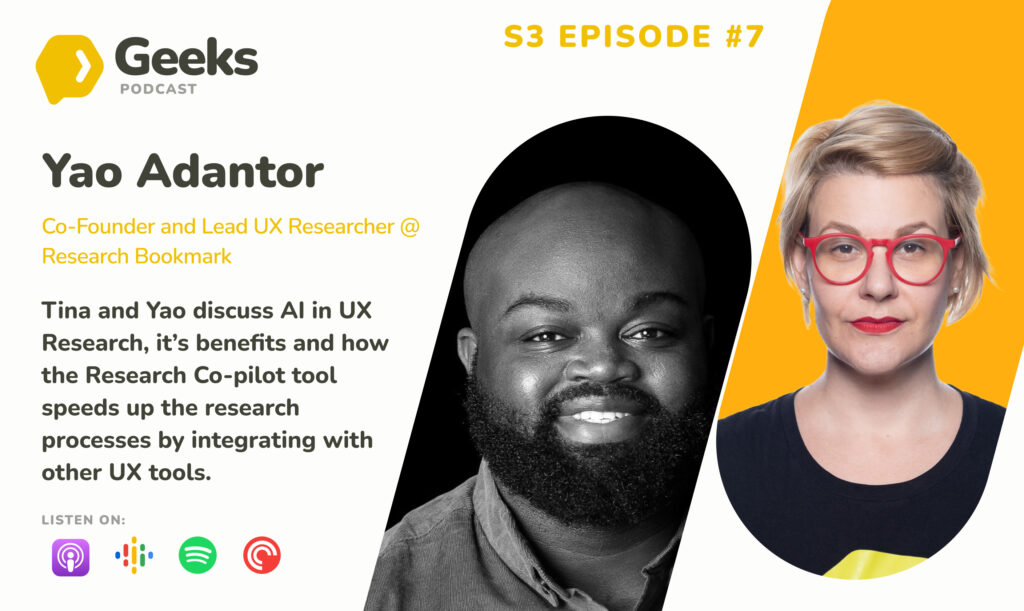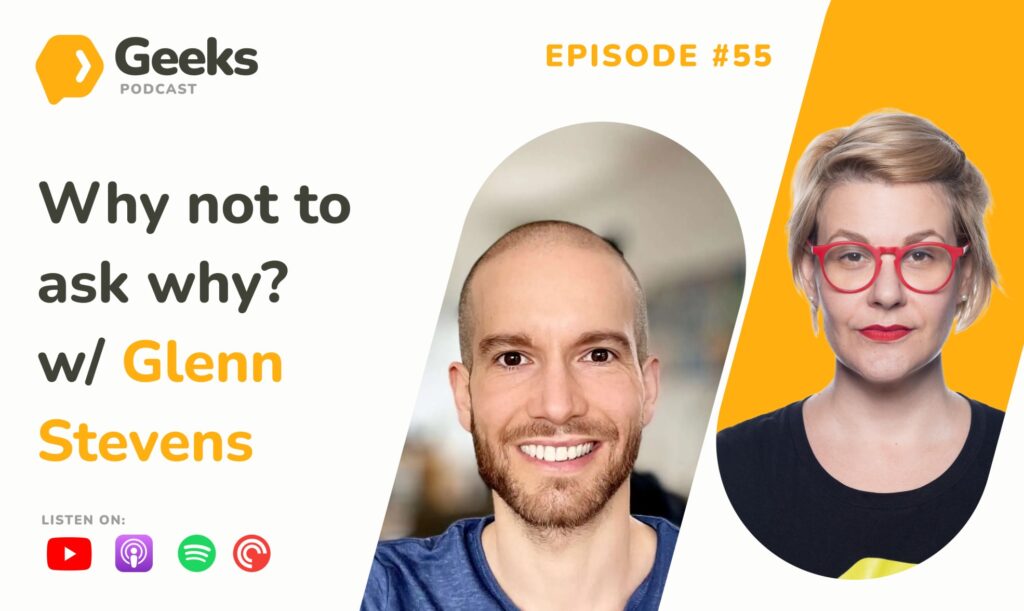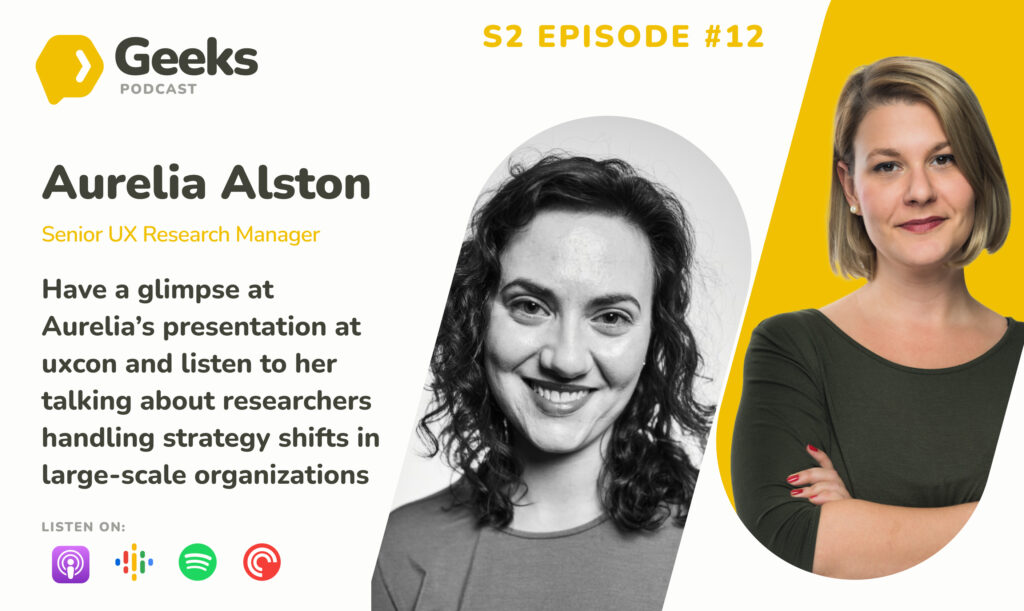Episode highlights
00:01:26 Kathleen’s Introduction
00:02:26 Views on Democratization
00:07:49 Challenges in Democratization
00:11:47 What Not to Do
00:13:07 Attend the Presentation
About our guest Kathleen Asjes
Meet Kathleen Asjes, an Independent Research and Insights Leader, Consultant, and Coach with a 15-year tenure in digital product development. Leading ‘Stippen,’ Kathleen is committed to nurturing the growth of researchers and steering businesses from data-driven models to insights-informed strategies. With past roles as Head of Research and Chief Product Officer, she has focused on user research, establishing research practices, and expanding research teams across diverse sectors. Living in South Korea, Australia, Sweden, and France has enriched Kathleen’s expertise in cultural and intercultural communication, positioning her as a knowledgeable guide for products entering new markets and teams navigating multinational landscapes. To explore collaboration reach out to Kathleen on her LinkedIn.
About uxcon Vienna
uxcon Vienna is a conference dedicated to UX Research and UX Design. It brings together professionals, experts, and enthusiasts in the field of UX to share knowledge, insights, and best practices. The conference is attended by both specialists from both Europe and the US, thus providing a great oppotunity for networking or professional exchange. Attendees can expect to learn about the latest trends and developments in UX research and design, gain practical skills, and connect with like-minded individuals. uxcon Vienna aims to inspire and empower UX professionals to create impactful user experiences.
Podcast transcript
[00:00:00] Tina Ličková:
Welcome to UX Research Geeks, where we geek out with researchers from all around the world on topics they are passionate about.
I’m your host Tina Ličková, a researcher and a strategist, and this podcast is brought to you by UXtweak, an all-in-one UX research tool.
This is the 21st episode of UX Research Geeks, and you’re listening to the episode where I was talking to Kathleen, who is going to be a speaker on the uxcon. In this short special, we were talking about democratization. Yeah, you heard right, democratization. The very much hatred and fear topic and for some the holy grail.
It’s a topic where Kathleen has really big experiences and insights that could help you to democratize research in your organization. For more information and more speakers on the conference uxcon in Vienna happening in September, visit uxcon.at.
Kathleen, you have a very interesting topic of democratization. Which is probably, I would say, polarizing a topic, but before we jump into this, I would like to know who you are, what do you do?
[00:01:26] Kathleen Asjes: Yes, so my name is Kathleen. I am an independent research and insights consultant or, yeah, research leader. I have been leading research and research teams for the past 15 years in different countries, different places, different types of companies.
I have worked and lived in Now I have to think a bit- it’s a list. So I’ve worked and lived, I’m from the Netherlands, but I’ve worked and lived in South Korea, in Australia, spent 11 years in Sweden and now moved to France last year. So I’ve been meandering around the world and also meandering around different workplaces and different places where I do user research and work with user research and digital product development.
And I love it. It’s amazing.
[00:02:10] Tina Ličková: Nice. This is really interesting having the view on democratization from different cultures, perspectives, countries. Can you tell me more about what you see when you look only from your experience?
[00:02:26] Kathleen Asjes: Yeah, it took me a while to realize the following. I’m pro democratization.
And of course, people argue with me because they’re against it. And I think it’s ridiculous. Like, why would I? If I’m a chef and when I cook, I know how to cook a great meal. Why would I teach a home cook to do the same? Like they should come to my restaurant instead. They have all these analogies about democratization, about why it’s a bad idea.
And I would always become quite defensive and I would always be like, okay, why not share your practice? You have a love for your practice. You really love doing it. Why not share it with others so they understand what you do? Because that’s quite a common problem, right? For user researchers.
Like people understand that you should have an impact. You can have impact, but they give you this piecemeal kind of validational stuff to do where you can’t actually Excel show what you’re capable of. So why not include them firsthand? And that way they can see what is possible. That people would be really argumentative with me and really low and it, you can lose your job.
They have examples. I told people how to do research and then I lost my job. And that kind of made me think a bit like, okay, so maybe it is a cultural thing. Quite often I must say, and this is of course also terrible to say, but Americans who tell me that research democratization is a bad idea. And that made me realize, okay, yeah, maybe job security.
And the work situation is just very different over there. Like I said, I worked in Sweden for 11 years. Everyone loves research democratization. Of course, not everyone, but a lot of people do. They’re really open to learning tasks and things that are outside of their own work environment or their own skill set because they have this attitude of lifelong learning and so on.
They do not have to pay, I don’t know, exorbitant amounts of money for their degrees because studying is free. There’s this attitude of lifelong learning because you can always educate yourself more. So there’s no, People trust each other to, to, yeah, be open, collaborate, work together and learn together on the job.
You don’t have to protect your practice or your skill set as much. Because it’s not, there’s this willingness to just do it together. And I think maybe in other cultures where you’ve had to pay a lot to gain a certain degree or education, and when you have to, where you can be fired with only one month’s notice, or even less, a couple of days notice, maybe that’s different, maybe you have to keep your expertise close to you because that’s what keeps you in that role and keeps you in that position.
In Sweden, within half a year of employment, you have a permanent job, no one can fire you, it is very expensive, it’s a terrible thing to do, and it rarely happens. So it’s a very different approach, I think, both in terms of like, how much education costs, as well as how secure the jobs are. And I think that maybe explains some of the different attitudes towards it, but I’m not sure.
Now people will be yelling at me, saying that was not true.
[00:05:32] Tina Ličková: I love it. I love what you are bringing to the table, the social and political context of it. I never saw it that way. I am probably, we are on the same side when it comes to pro democratization. I always remember Zygmunt Baumann telling people that multiculturality is not a choice, it’s a given.
And for me, democratization is the same. Like we have to do it, we just have to figure out how to do it. Yeah. And I’m coming from the name of your talk at uxcon. What are your hopes and dreams for democratization that you can share with us in this short special?
[00:06:11] Kathleen Asjes: I hope that we can stop arguing about it.
First of all, there’s a different place and space. To use this as a tool, like it’s a tool, one of many tools that we have as a researcher. Like in some places and spaces, in certain companies, in certain situations, it’s a great tool to use and people should be free to use it. And I want it to be the researcher’s choice to do it.
They have to be behind it. Otherwise it’s going to be terrible, of course. But there might be other situations where it’s not the best tool for what you’re trying to do. And in those situations, you should be able to evaluate, would this help me? Yes or no? And if the answer is no, it should be fine to not do it, right?
So there has to be choice, and there has to be this analysis of, okay, what situation am I in? And I like to see it along the axis of what is our research maturity status, and what is our presence. Like how many researchers are there? Are we underrepresented? Are we overrepresented? Like, where are we? And I think quite often, these are the two things that matter a lot to researchers.
We want to increase the maturity because the better the understanding is of the people around us of what we do and what we can do with research, the more impact we can have. And at the same time, we always feel that there’s not enough capacity for us to do what we want to do. So I think they are two things that matter a lot to us, increasing capacity, increasing maturity, and I think quite often.
Research democratization can be a tool that helps us.
[00:07:40] Tina Ličková: Did you ever experience when the research democratization didn’t go as planned or did go really bad?
[00:07:49] Kathleen Asjes: Yes. I’m not sure if I would say really bad, but I remember at one point, me and my team, we did this experiment with, I was working in a media company at a time in Scandinavia, and we were doing an experiment with one of the publishing houses or media houses in Norway.
And the idea was that we do this kind of thing, we call it a research safari, during one week everyone on staff is going to be involved in some kind of research. To really shake things up. So we came in that week and we brought all our research materials with us and people could sign up to either come and do guerrilla testing.
They could sign up for interviews. They could sign up for things like hosting focus groups and so on. They could participate in different days, different times, and different places. And I think. Yeah, at least half of all the staff participated in this, and it was amazing. There was this massive buzz around the company, and everyone was loving it, and everyone was talking about what users were saying about the newspaper, and how they were reading, or how they were not reading.
Great discussions. And then we had this idea, or at least I had this idea, I think my team was already like there, that everyone took notes, and I think we had around a hundred different participants like users who participated that week. So we had notes from I think 30, 40 staff members on all these different conversations they had.
But just imagine the mess this was, like notes, handwritten notes, some typed out, some not. Like the way people take notes, you can’t read it, you can’t understand it, you can’t make anything out of it. But we still persevered and tried to have some insights from it. Because we promised that we’ll do this for a week and it’ll be amazing.
And then there’ll be all these insights on these research questions that… You have. Yeah. The insights were not that amazing because the quality of the research was not amazing, obviously. And maybe that was not the main thing that was happening that week. It was not about the actual research or the insights.
It was about socializing the concept, socializing the idea of if you have a big question, go outside to ask it. Don’t sit in a group and brainstorm inside. So maybe that was the biggest impact we had, that people understood the value of going out and talking to the users. They understood that you need to be prepared and have a good plan for it.
They understood it was valuable to do. So that was the magic, but I tried to squeeze something out of it that wasn’t really there. The researchers who had to do the analysis really suffered. They really suffered and they worked hard, and I’m really sorry in hindsight, I made them do it now, but you learn.
[00:10:40] Tina Ličková: As they say, an experience is what you get if you don’t get what you want.
[00:10:44] Kathleen Asjes: Yeah, definitely.
[00:10:47] Tina Ličková: Going back to your metaphor with the cook and home cooked meals. What would be your recipe that you can share already now?
[00:10:59] Kathleen Asjes: So my favorite recipe that I like to cook a lot is the one I shared just before it’s all about getting everyone on board, letting everyone try and letting them jump into the deep end, creating the conditions where people can just step in, get them, receive a manuscript, then say hi to one of their users and ask them questions, and then learn the hard way that it’s really hard to do.
It’s almost a bit like shock therapy, right? Oh, is this what it’s like? And people get nervous and they get sweaty and they get a bit anxious, but then they also really enjoy it. Something magical happens to them. I really love that part of it. I think it’s a great way to do it.
[00:11:39] Tina Ličková: Is there anything you would say, Oh, please don’t do it. Don’t cook this meal like this or don’t put these ingredients into it.
[00:11:47] Kathleen Asjes: Yeah, I think, so if this recipe is like the stir fry, throw it all in the mix and you cook it really hot and really short, maybe the long, slow bake is maybe not the way to start trying it. You want to get people excited. So if you require them to have several weeks of training before you allow them to go out and do something, I think that is overkill.
Like in the end, you learn by doing, and you also realize what you need to learn. By doing it not so well. So you really have to be okay with mediocre research being done. And I think that’s also something that, people say yeah, but why do it at all? They have that against it. Like, why put up with mediocrity?
Like, why put up with something that’s not good? They will become good after a while, or better at least.
[00:12:45] Tina Ličková: I would have no like an utter hundred questions.
[00:12:49] Kathleen Asjes: Really?
[00:12:50] Tina Ličková: But let me end with sticking to the metaphor with the meals. Tell me maybe as the last thing, what exactly is the reason why people should come to the presentation or your talk in uxcon, what will you serve there?
[00:13:07] Kathleen Asjes: What will I serve? What am I cooking up? I’m cooking up a storm, obviously. Now, what I will help you figure out is what is a different place and space where research democratization can serve you, can really help you get to the next level in terms of either research maturity or in terms of increasing your team?
And when should you maybe not do it? It’s okay to say no. And I will also touch upon that, what are the other sides? So I’m not going for black and white, I’m going for gray. In the middle, it’s murky water. There’s different situations, places that call for different things. And I love to explore that together.
[00:13:46] Tina Ličková: Nice. I really like the gray area. Kathleen, thank you very much. Maybe just to give people a possibility to connect with you, what is the best choice?
[00:13:57] Kathleen Asjes: For LinkedIn, please, Kathleen Asches. Yeah.
[00:14:01] Tina Ličková: Okay. Thank you. And we see you in uxcon in Vienna. I think your presentation is going to be on the 14th of September, so let’s meet and chat there because I have to ask you those hundred questions.
[00:14:13] Kathleen Asjes: Yes, please do. Really looking forward to it. Thank you.
[00:14:16] Tina Ličková: Thank you.
Thank you for listening to UX Research Geeks. If you liked this episode, don’t forget to share it with your friends, leave a review on your favorite podcast platform, and subscribe to stay updated when a new episode comes out.
💡 This podcast was brought to you by UXtweak, an all-in-one UX research software.















